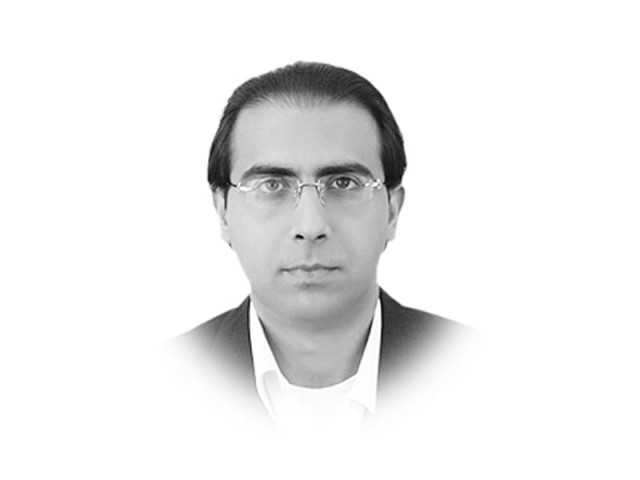Joining the Munazara
If SIC & TTP are 2 mainstream ideological extremes on political spectrum, then surrender flag proudly flutters already

The writer is a lawyer and partner at Ijaz and Ijaz Co
in Lahore
saroop.ijaz@ tribune.com.pk
The dark comedy of this particular ‘munazara’ symbolises a much deeper infection. The conversation on the future of this state is now between the far, far religious right and the extreme, out of the ballpark, medieval religious right, with only degrees of violence separating them. At some level, it makes sense, since we have made our mind to ‘negotiate’ and hence, we need to learn and speak the only language that ‘they’ understand. Very well, however, it would be nice if we go and revisit the question of ‘what’ are we negotiating for. Human lives indeed, yet, is there anything else in this system, in this state that is worth defending? If the Sunni Ittehad Council and the TTP are the two mainstream ideological extremes on the political spectrum, then the flag of surrender proudly flutters already. And they are; the rest is becoming the fringe opinion.
The ISPR release on Syed Munawar Hassan said all the right things except one, the disappointment shown on Maulana Maududi’s party taking such a hard line. Ah, the agony of choice; the good acceptable, mainstream Maulana Maududi or the hawkish, radical Syed Munawar Hassan?
Let us take a few examples of how we have historically adapted to the ‘language’ of the dialogue. Two statements; first, “If the Parliament by a constitutional amendment makes Pakistan as a secular state, though Pakistan is founded as an Islamic Ideological state, can it be argued that this Court will have no power to examine the vires of such an amendment.” Second, “Who has the right to legislate and who has authority in Pakistan? Is it Allah alone or the majority of the representatives in Parliament … ? The answer is that the right to amend the Constitution belongs to the majority of the representatives … and two-thirds of them can change its name to Pakistani-American Republic or Pakistani Christian Republic.”
Apologies for the elaborate quotes, two different statements, yet, one can detect a vague, yet unavoidable, common thread. So who were the makers? The first statement was made by His Lordship, the then chief justice of Pakistan, Ajmal Mian, in a seminal constitutional case (the sentiment was also repeated by the present chief justice in the Eighteenth Amendment proceedings). His lordship was contemplating the question of if the Court has the power to judicially review constitutional amendments. The second is by Dr Ayman alZawahiri, the al Qaeda leader in his treatise on the Constitution of Pakistan, “Morning and the lamp”, which argues that the foundational document of the Pakistani state is un-Islamic and hence, the state is a legitimate target for jihad. The objections of Dr Zawahiri regarding the nature of the Constitution of Pakistan are the same as that of Maulana Maududi, Samiul Haq and Syed Munawar Hassan, etc. The harrowing bit is that the texture of some of the argument remains the same even when made by the Apex Court (admittedly for completely different purposes).
The arguments of Dr Zawahiri on ‘hakimiyya’ (sovereignty) are identical to those of Syed Qutb and the intention displayed in the Objectives Resolution of the Constitution. As a side note, Dr Zawahiri and Maulana Maududi seem to share the same view about the vision Mr Jinnah had for this country.
It is hardly a wonder then that Adnan Rashid’s letter to Malala on why she was shot and would be again, given the opportunity makes some ‘fair/valid’ points according to many a budding anti-imperialist. Our soldiers fight for our very existence against an ideology, which represents the most fundamentalist, hardline interpretation of religion. The ISPR does them and us no favours by showing deference to Maulana Maududi. The motto of the Pakistan Army is “Iman, Taqwa, Jihad fi Sibilillah”. As believing Muslims, some of us might have this as a personal motto, yet, to have it as the official motto for an army representing a nation state, and fighting the war that they are?
Is all of this a ‘munazara’ already, with both sides fighting for their version of theology? Well-meaning leaders iterate their commitment to establish an ‘Islamic Welfare’ state. Are they naive enough to believe that the determination of what would be ‘Islamic’ in an Islamic Welfare State would be left to them?
The point of all of this is that we, the people and the state, have to join the conversation. We have a legitimate life interest in the outcomes of ‘munazaras’ going around us. The state, starting from the Objectives Resolution, made promises, and those promises were made in the language of Maulana Maududi and Dr Zawahiri. If the state does not, the TTP intends to deliver on it. Now, they and their followers want to hold the state to those promises, and more particularly, their interpretation of them. Once the state leaves its turf and argues in their language, their variables, the argument is perhaps, already lost. While the race for piety continues amongst mainstream politicians, media personnel, public intellectuals and the state, all of them seem to miss one basic point. None of it will ever be good enough. Ziaul Haq’s ‘Islamised’ Constitution is still pagan for the puritanical Dr Zawahiri. It is time for the state and the people to go back and make new promises, and in the language that they can communicate in, and so we do not have to wait for the ‘munazara’ to end as we sit dumbfounded, waiting for the verdict.
Published in The Express Tribune, November 17th, 2013.
Like Opinion & Editorial on Facebook, follow @ETOpEd on Twitter to receive all updates on all our daily pieces.















COMMENTS
Comments are moderated and generally will be posted if they are on-topic and not abusive.
For more information, please see our Comments FAQ